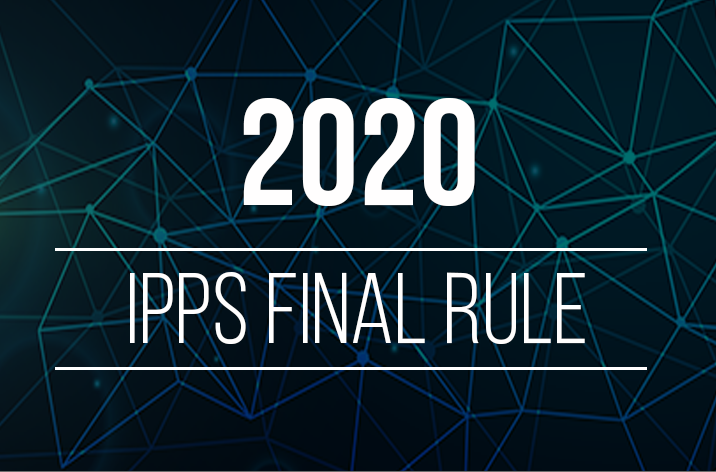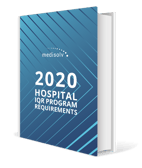2020 IPPS Final Rule: 10 Things to Know

CMS dropped the 2020 Inpatient Prospective Payment System (IPPS) final rule, which focuses on measure adjustments to reduce quality reporting burden, supporting quality care in rural areas and revising policies related to new technology add-on payments.
The requirements released in the 2020 IPPS Final Rule have since been updated in response to COVID-19. Download the COVID-19 changed PDF.
If you haven’t been able to get through the grueling 2,200+ pages, don’t fret. We have you covered with the highlights of the final changes below!
Let’s take a look at what CMS has in store for us in 2020.
IQR Program:
Reporting Requirements
The IQR reporting requirements will remain the same for 2020. Hospitals must submit one quarter’s worth of data for four eCQMs.UPDATE: In response to COVID-19, Q1 & Q2 data submission is not required and will not be used to determine payments. To learn more about these changes, read our blog on quality reporting changes due to COVID-19.
Opioid eCQM Submission
In 2021, CMS is adding a new Opioid eCQM (Safe Use of Opioids – Concurrent Prescribing), and in 2022 they are requiring that your hospital submit this new Opioid eCQM as one of your four required eCQMs.The Hybrid HWR Readmission Measure
CMS also finalized their plan to adopt the Hybrid HWR Readmission measure. Voluntary reporting July 1, 2021 – June 30, 2022 and July 1, 2022 – June 30, 2023. Mandatory reporting in 2024.EHR Technology Certification
Your EHR technology still must be certified for all the available eCQMs in 2020 and beyond.
PI Programs:
Measure Removal
CMS will remove the Verify Opioid Treatment Agreement measure from the PI program.Bonus Points for the PI Program
CMS will keep the Query of Prescription Drug Monitoring Program measure as optional for bonus points in the PI program. This reverses last year’s final rule.HAC & HRRP:
Measure Removal Factors
CMS has adopted eight new measure removal factors for both programs. These removal factors align with the same ones implemented for the IQR and HVBP programs.
HVBP:
HAI Measure Calculation
Starting in 2020, CMS will use the same data as the HAC program to calculate HAI measures in the HVBP program.
Increase in Wage Index Value:
For low-wage hospitals (below the 25% percentile), CMS will increase the wage index value by half the difference of the wage index value for that hospital versus the 25% wage index value of all hospitals.Development of New Technology:
CMS will expedite the development and review of “transformative new drugs and devices.” They are also increasing the add-on payment for new medical technology from 50% to 65%.Payment Rate:
Increase in Payment Rate
The payment rate paid to hospitals will increase by 3.1% compared to 2019. CMS estimates this to mean a $3.8 billion total increase in 2020.Disproportionate Share Hospitals
CMS will distribute $8.4 billion to those hospitals that are considered Disproportionate Share Hospitals (An increase of $78 million from 2019).1. Measure Changes: The Hospital IQR program adds one new opioid-related eCQM and a Hybrid measure.
Last year, CMS finalized the removal of dozens of measures from the IQR program in 2019 and beyond to focus on more meaningful, patient-centered outcome measures. You can check out the full list of IQR measures being removed for 2019-2021 here.
In this rule, CMS has made additional measure changes:
• Adopt one new opioid-related eCQM beginning with the CY 2021 reporting period:
o Safe Use of Opioids – Concurrent Prescribing (CMS decided not to adopt the second opioid-related eCQM which was Hospital Harm – Opioid-Related Adverse Events)
• Remove the Claims-Based Hospital-Wide All-Cause Readmission measure and replace it with the Hybrid Hospital-Wide All-Cause Readmission (Hybrid HWR) measure.
2. CMS requires an Opioid eCQM by 2022.
The reporting requirements for the IQR program largely remain the same over the next few years but CMS has added one new opioid eCQM. Here is what you need to know.
- For 2020 and 2021 you still only have to report one quarter of data for four eCQMs.
- In 2022, you still only have to do one quarter of data for four eCQMs, but one of those eCQMs must be the proposed Safe Use of Opioids – Concurrent Prescribing eCQM.
3. CMS adopts the Hybrid HWR Measure as a part of your IQR requirements.
CMS is making the Hybrid measure a part of your IQR requirements by 2024. It will start with two voluntary reporting periods, July 1, 2021 - June 30, 2022, and July 1, 2022 - June 30, 2023, before making the measure a requirement in 2024.
Keep in mind that the voluntary submissions for the Hybrid HWR measure will have no impact on your Medicare payment determination. As part of the pilot program in 2018, CMS received 150 voluntary hybrid submissions—and a whopping 69 of those were submitted by Medisolv on behalf of our clients!
4. CMS will use the same data to calculate the HAI measures for both the HVBP and the HAC programs. The data will no longer be collected in the IQR program.
Starting in 2020, CMS will use the same data as the HAC program to calculate HAI measures in the HVBP program.
Note that these NSHN measures will no longer be a part of the Hospital IQR program in 2020.
5. Removal of the Verify Opioid Treatment Agreement measure and retracting the Query of PDMP measure for the Medicare and Medicaid Promoting Interoperability Program.
Beginning next year, CMS plans to remove the Verify Opioid Treatment Agreement measure from the Promoting Interoperability (PI) program, formerly known as the Meaningful Use program, after receiving feedback from stakeholders that the measure was burdensome and challenging to implement.
CMS will also keep the Query of Prescription Drug Monitoring Program measure as optional for bonus points in the PI program. In 2019, CMS had previously finalized that the measure would be required, but they’ve changed that requirement in this rule.
6. There will be new measure removal factors for the Hospital Readmissions Reduction Program (HRRP) and the Hospital-Acquired Conditions (HAC) programs.
CMS will adopt eight new measure removal factors for the HRRP and the HAC programs. These measure removal factors would align with the measure removal factors that have already been implemented for the Inpatient Quality Reporting (IQR) and Hospital Value-Based Purchasing (VPB) programs. You can read about the eight measure removal factors in this blog that explains how this affects the IQR program in 2019 and beyond.
7. The wage index is being adjusted.
CMS plans to address the wage index discrepancies between rural and urban hospitals by increasing the wage index values for low-wage hospitals below the 25th percentile. They will increase it by half the difference of the wage index value for that hospital versus the 25th percentile wage index value of all hospitals.
Unlike in the proposed rule, they will not be decreasing the wage index values for high-wage hospitals above the 75th percentile. Instead all hospitals will share this burden, but it will be capped at 5% of wage index value. This policy will be effective for at least four years starting next year.
8. Adjustments to the new technology add-on payment.
CMS is expediting the development and review of “transformative new drugs and devices.” Under this rule, once the FDA provides “marketing authorization” for one of these medical devices that are in the expedited program then they receive the new technology add-on payment (as long as they meet the cost criterion).
Also new for new technology add-on payment calculations, CMS will increase the add-on payment from 50% to 65% for FY 2020. Medicare believes that paying only up to 50% of the cost of new medical technology doesn’t meet the high costs associated with these new technologies.
9. The operating payment rate is increasing.
Next year, the operating payment rate for hospitals that successfully report to the Hospital IQR program and are meaningful EHR users will increase by 3.1%. CMS estimates this to mean a $3.8 billion total increase for 2020.
10. CMS is providing more money for uncompensated care
Each year CMS distributes funds to hospitals who care for more uninsured patients. They call them “disproportionate share hospitals.” CMS projects that it will distribute $8.4 billion in uncompensated care payments in FY 2020, which is an increase of $78 million over last year.
We know that keeping up with these yearly regulatory changes can be overwhelming. That’s why we have dedicated clinical experts who can help you better understand what each change means for your organization and ensure you have a comprehensive quality program.
Let’s conquer your quality goals together. Send us a note today.
FREE DOWNLOAD:
2020 Hospital IQR Program Requirements eBook
Ensure a smooth and stress-free submission to the Hospital Inpatient Quality Reporting (IQR) program. Download the 2020 IQR Program Requirements eBook, which includes all you need to know to successfully complete the program in 2020.
 |
This guide includes:
|

.png?width=352&name=2026%20Quality%20Reporting%20Deadlines%20Guide%20(1).png)



Comments